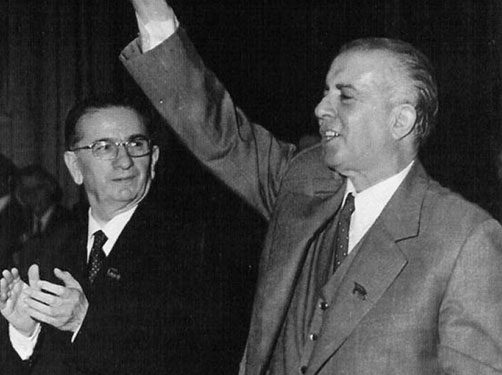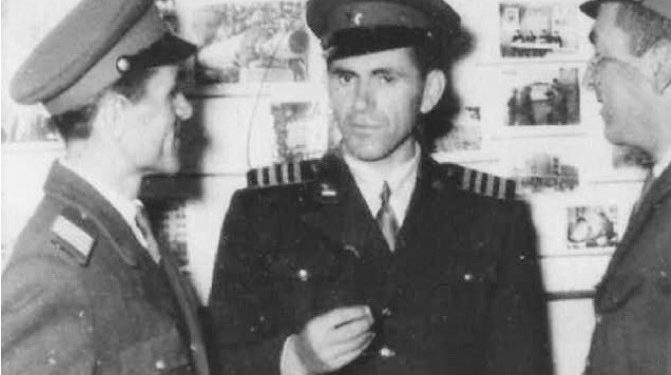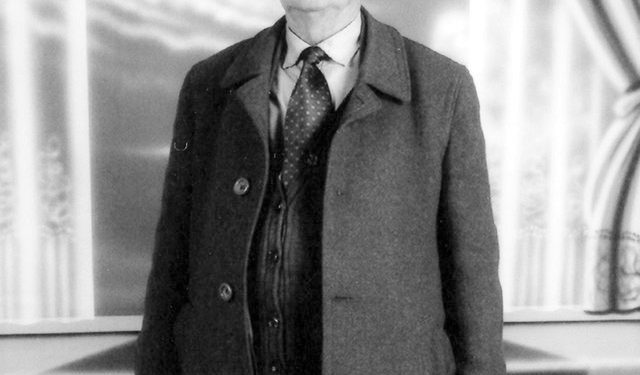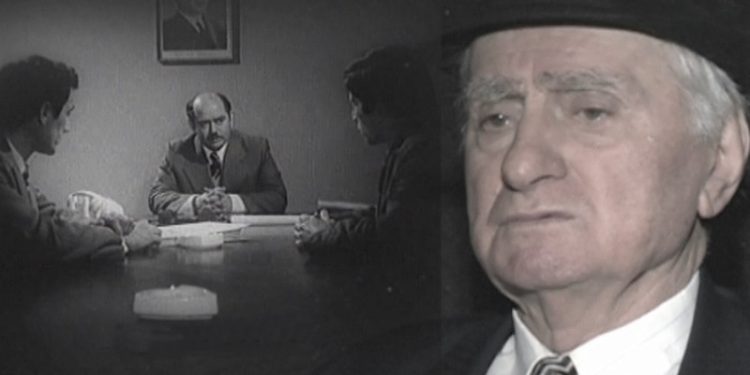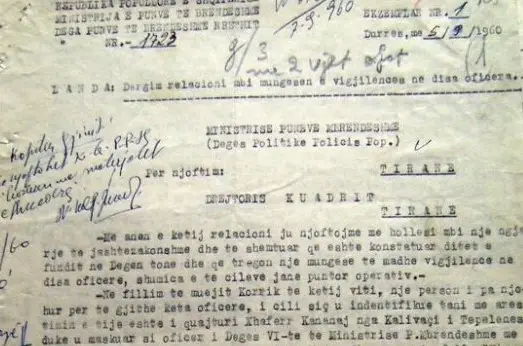By Florenc Bakillari
The fourth part
– The rare story of the villager from Kalivaçi i Tepelena who, after announcing himself as a Security officer, presented himself as Kadri Hazbiu’s special envoy, in the Internal Affairs Branches in Shkodër and Durrës-
Memorie.al / Xhaferr Kanani, the rare character, in his account of the extremely dangerous adventure he undertook in 1960, that of the self-proclaimed State Security officer and then the introduction to “colleagues” in the Department of Internal Affairs of Shkodra and that of Durrës. Even after almost five decades from that time, he wondered about the lack of vigilance there, right in the den, where the plans for the arrests, tortures, persecutions, imprisonments and exiles of dozens of Shkodran citizens were hatched. Xhaferri would be surprised by the presentation and the warm reception given to him by the top leaders of the Internal Affairs Branch of Shkodra, starting with the chairman, Colonel Feçor Shehu, the Chief of Police, Colonel Skënder Vinçani, the Chief of Security, Lieutenant Colonel Hysen Hoxhati , etc. After becoming known in Shkodër, he decided to continue his dangerous game in the city of Durrës. Shkodra would give Xhaferr Kanan, the fake major, the pleasure of accompanying Prime Minister Mehmet Shehu, who visited the northern city in the summer of 1960, while Durrës would accompany Enver Hoxha during his visit to the Labor Party. of Albania, Enver Hoxha, accompanied by most of the members of the Political Bureau, had come to the coastal city to see off Maurice Torrez, the head of the Communist Party of France, after his several-day visit to our country. The history of his “inspection, as a special envoy of the minister Kadri Hazbiu” in Shkodër and Durrës, has been described in detail by the character of our article, Xhaferr Kanani, in his long interview, which will be published in several numbers.
Continues from last issue
Mr. Kanani, why did Kadri Hazbiu ask you not to name the officers?
For me personally, Kadri Hazbiu was a smart man, a psychologist, pure in spirit, so an extraordinary man. He saw well the purpose of my adventure and found in it no malice or agential connection, to the detriment of my country. According to him, this whole story arose from the lack of vigilance in the Shkodra and Durrës Branches. For me, both leaders of these Branches looked at women’s dresses more than they did their duty, so they stopped and arrested innocent people. I remember many cases when their Branches had arrested some people, for completely useless things. They even abused them, until they lost their senses. I had said these things to both Feçor and Kopi Nikos, even in some cases, I even responded to the latter as if I were really Kadri Hazbi’s special envoy.
Has any member of the Political Bureau contacted you?
My adventure could not remain a discussion only on state lines; many of my contemporaries know this. I want to express an interesting meeting with Hysni Kapo. Around the end of October 1960. While I was staying in the dungeon, lieutenant colonel Besim Selita came and took me to his office. There I saw two groups facing each other. On one side stood Hysni Kapo with others, senior officials of the APS, such as: Manush Myftiu, Foto Çami, Rrapo Dervishi and on the other side, Kadri Hazbiu with his subordinates, such as: Mihallaq Ziçishti, Rexhep Kolli, Qazim Kondi , Xule Chiraku.
Both groups, as soon as I entered, turned their gazes towards me. After a while, the questions start. On Hysni’s side, Foto Çami kept the notes, while on Kadri’s side, Llambi Peçini. Hysniu started to ask me about my activity. He told me that we would switch roles and I would tell him about my activity, that is, I would say the reasons why I had dealt with the Ministry of the Interior that I had become a big problem. The first question was why, according to him, I had made all this mess in two of the Internal Affairs Branches in Shkodër and Durrës. I told him that it all started as a youthful adventure, that is, for a girl, since I liked her very much.
Hysniu continued with the next question, whether I was engaged to the girl. I answered with a resounding yes, and I even told him that I had been engaged since March. He immediately told me that it was now October. I stopped at clarifying the circumstances of my acquaintance with the girl and some data about her. I always gave honest answers, as it had actually happened. After learning about this issue, Hysni Kapo wanted to know the reasons why I had interfered with the Internal Affairs Departments and why I had intervened to get the detainees out of prison. So the man with the most party power at that time, after Enver Hoxha, wanted to know why I had given an opinion to release unknown persons to captains and officers in the Internal Affairs Branches, in Durrës and Shkodër.
Did you have a long conversation with Hysni Kapo?
I talked with him, of course in the presence of others, for about 2-3 hours. After he finished with these questions, he asked me to know about my relations with the foreigners, who were resting on the Durres Beach, and alluded to my close relations, especially with the Germans. Here I remained tight and told him that we were one to zero. “Where does the soldier get his uniform, when he is a host that he keeps himself a host? That you learned these things. And you, why did you get the uniform in Durrës?! – Hysni Kapo asked me again.
I told Hysni that I had lied to the boss of Prapavija, telling him that I had a fabric in Tirana, which I would sew for my uniform. But until it was sewn, I asked him to give me a uniform rank, and he gave it to me. I never took the piece to Basri Bedini, as I had nowhere to find it. When I explained to him how I justified myself to get the uniform, he couldn’t stand it and told me that we had become two with zero. The same situation arose when he asked me about the armament. Likewise, I had lied about the gun. I had told the head of armaments of the Durrës Internal Branch that I owned a very heavy Soviet pistol and asked for a lighter one.
They gave me an Italian “Bereta” without cartridges, which I never used. “Listen Xhaferr Kanani, you are strong from bravery. What you have done, there are two things. If what you had done was a function of the state, you would have been a hero twice, while if you had escaped outside of Albania, the foreign services, opposed to Albanian politics, and would have made a novel and a movie about me, about the way I you had thrown the State Security. We, the Security, have called them blue eyes, but they turned out to be blue eyes. We took them to study for 5 years in the Soviet Union, while you threw it away for five minutes. We cannot call this vigilance”, Hysni Kapo told me.
How did the conversation with Hysni Kapo end?
Hysniu was talking to me and at the same time he was looking angrily at the leaders of the Ministry of Interior, who was in front of him. When there were no more questions to ask, Hysniu addressed those who were sitting next to Kadri Hazbiu. “Listen here, for a simple man like Xhaferr Kanani to come, enter the Leadership Block, hold conferences, release prisoners, order soldiers, give opinions, learn secrets, has not been seen in any other country. This is all the incompetence of the leaders of the Shkodra and Durrës Branches, who were deceived by an anonymous man who had nothing to do with the State Security.
Imagine if Kanan was a man inserted by foreign agencies, to learn our secrets and weaknesses. For this, responsibility will be held to one and no one will escape the analysis and punishment”, said Hysniu. After these words, he stood up, gave me his hand and said: “Here where you are, they should have been and you, ‘major Xhaferri’, have only one fault. Why didn’t you throw Feçor Shehu and his friends in Buna, while Kopi Nikon and company were in the pier of Durrës”?!
Did this cause you problems while being questioned at the inquest?
Yes, I’ve been hurt. During my investigative process, with a special interest in my relations, especially with the Germans, whom I respected as tourists to let them understand that, our country and our people were hospitable. My accusers wanted to know why I was hanging out, what I was talking about, as they thought I had planned to escape to Germany. I remember a case in Durrës, when the head of the Department of Internal Affairs, Kopi Niko, told me that foreign tourists, especially Germans, had exaggerated a bit with their short clothes, which contradicted the socialist reality, which required imposing the regime of that time.
Colonel Niko told me that in some cases, he had told the policemen that while washing the streets with water, with the cars of the Municipal Company, they should also spray foreigners with water, especially women. But I immediately contradicted him and told him to stop this absurd and childish method. This, in the investigator, was taken as a basis for bringing the accusation, placing it at the service of foreign agencies. They told me that I, under the pity of the Germans, was hiding my collaboration with them. They even told me that in this context, I also went against the superiors of the Durrës Branch, who had received instructions for the actions they were carrying out.
Do you have any special memories in your dealings with strangers?
Many tourists who came to Durrës stayed at the “Adriatik” hotel. I remember that their translator was called Fatmir Belishova. One day, Fatmiri and Shaban Kokomanin, told me that a Hungarian doctor requested permission from the Department of Internal Affairs to visit Gjirokastra, Saranda, Pogradec and Shkodra alone, not in a group. My contemporaries know that tourists visited in groups and never alone, moreover, the latter was not allowed. There was a fear at that time that among the tourists, there could be agents, who sought to obtain information, and tourist visits were the best opportunity to realize their goals.
Then I thought it would be good to introduce the chief of passports, Captain Izet Gjergjova, who was suffering from a stomach ailment. I told the latter that the Hungarian woman was a doctor and could pay him a visit in exchange for permission from the Interior Department to go to four cities unaccompanied. That’s how it was done. We secured the permit and the Hungarian tourist was quite satisfied. But this whole story turned against me. During the months at the interrogator, I was asked dozens of questions that aimed to find out why I had helped the Hungarian doctor to go unaccompanied to the cities she wanted to visit, when the order said otherwise!
When the foreign tourists left, did you keep in touch with them?
Surprisingly, even after they had left, German, Hungarian and Polish tourists sent me letters to the hotel “Adriatik” at my address. I was obliged to answer them back, but because I didn’t know German, I always called the translator, who gave me good advice. In the letters, I explained to them everything that had happened after their departure and especially the achievements of our country. When it came to the investigator, all the correspondence, they called me as an agency connection, with the foreign services and asked for specific names, the tasks they had given me, as well as the collaborators I had in the activity.
As witnesses, they asked the interpreter Nusret from Gjirokastra, who reproduced perfectly all the conversations I had had in his presence with foreigners, as well as everything that tourists from their country had written to me, as well as the answers I had sent them me, through Nusret. The testimony of this man was the starting point for removing the accusation against me, that I was an agent of foreign services.
Did the State Security believe the testimony of the translator, which removed a serious charge from your shoulders?
They didn’t fully believe him, but this served to decide in advance, the dismissal of the accusation of high treason against the country and putting him in the service of foreign agencies. The State Security, to prove everything about my correspondence with the Germans and the photos I had taken with them, sent to Germany, General Zoi Themelin, a major officer of the Ministry of Internal Affairs at that time, and General Nevzat Haznedar, a key person, in the links of the State Security.
They spent a lot of time in Germany and when they came, they told their superiors at the Ministry of the Interior that they had not been able to find any trace of my connections with the foreign services, so they considered it reasonable not to accuse me completely groundless since it would cost me my life, since the punishment was only one, shooting.
Your story forced the leaders of the Ministry of Interior to take action and punish many people. Do you believe that you somehow compromised the pride of State Security?
My story was an adventure that served the clans in the Ministry of the Interior, to hit each other. I was only used as an example, to do the next purges, especially in the ranks of people who had come from the War and it was quite difficult to remove them. I know that there was a circular that defined the measures to increase vigilance. This circular has been sent to all departments that were subordinate to the Ministry of Interior.
The blue eyes of the Security, had failed me and I in a way, had also served as a measuring unit to evaluate the vigilance, so much proclaimed, by the party of that time. Even, as I learned later, after I got out of prison, my story had turned into a special lesson for all those who would complete the school of the Ministry of the Interior.
The students learned that vigilance had to be strong enough and not to believe without trying everything yourself and the lecturers took my story as an example. They said that a young man from the village cheated, for eight months in a row, with dozens of cadres and senior officers of the State Security and the Ministry of the Interior. With some of those who learned history as a lesson in the Ministry school, I met in random circumstances, in the 90s, and they told me everything.
The investigations were finished and it was the turn of the trial process. How do you remember now, after almost 60 years, your trial?
In fact, the only thing that makes that trial memorable was the fact that it took place behind closed doors, so that the secret of what had happened to the State Security would not come out, but word had gotten out. Also, the way this process was developed, which was nothing but a comedy played with real characters, was one more reason to remember it. My trial took place in Durrës, as I allegedly committed the crime there.
They took me handcuffed from the isolation room of the Security Directorate of Tirana and took me to the coastal city. In the trial, the soldiers of the Department of Internal Affairs of Durrës and some young lawyers who had just finished their studies at the University of Tirana participated. This trial was intense, because it was closed in two days. The judges kept questioning me about my actions while I was a self-proclaimed Security officer. I remember that the head of the Trial Panel never called me a defendant, but only by name.
He understood that everything had happened as a result of the lack of vigilance of the officers of the Internal Affairs Branches of Shkodra and Durrës and I, I was just a young adventurer, but who had played by mistake, in the den of intrigues. So he had nothing to do with me, he was obliged to conduct my trial and even to give me the punishment based on the claim that the prosecutor gave, which punishment was not small. Several witnesses also came to testify there, who created a comical situation from the replies with me, which will hardly be forgotten by the participants in the trial, but everything can be read in the minutes kept during the trial.
Always when I was asked for clarifications, after the testimonies of my “victims”, I waited for them with humor, since I also knew the end of the trial. After the first session, they took me and took me to the Internal Affairs Branch of Durrës. Colonel Skënder Kosova and a couple of other companions took me to the dungeons that were laid with boards, following the order I had given when I was a self-proclaimed “major”. Even the second day was a copy of the first, and in the end, the court’s decision was a sentence of 14 years in prison. After making the decision, they brought me to Tirana. Here they put me in prison with the others, but I didn’t want to stay there.
Why did you want to leave Tirana Prison?
Everyone felt sorry for the punishment I received. This was expressed to me by the vast majority of those who visited me during and after the investigation. Kadri Hazbiu himself intervened for me to serve my sentence in the Artisanat Prison in Tirana, in order not to have contact with political prisoners, but I had decided to go to the Bulqiza Prison. This was not just wishful thinking, but there is a story behind it.
At the time I was in the investigator and I was interrogated by Hysni Kapo and Kadri Hazbiu, with the group of major officers of the Ministry of the Interior, there was also Colonel Hazbi Lamçe, who at that time was the director of Bulqiza Prison. He had told me, shortly after the others left, that when I was sentenced, I should ask that I serve the sentence in Bulqiza, because he would treat me well. I did the same; I submitted a request to be taken to Bulqiza. While I was in the Tirana Prison, a lieutenant from Skrapari told me to go because, he wanted me to meet, a big man with power.
Who was this powerful person who visited you after the sentence?
I was surprised when the lieutenant told me that Prime Minister Mehmet Shehu had come to visit the Craft Prison in Tirana and asked about me. After that, the prison authorities ordered to bring me to a meeting with Shehu. I asked the lieutenant that; what the prime minister had to do with me. I was one of the convicts of that prison. He told me that he had an order to accompany me to the office where Mehmet Shehu was and he didn’t know anything more. I went out of curiosity to find out what a man like Mehmet Shehu wanted to talk to me about.
He was accompanied by a large number of officers, such as: Beqir Balluku, General Halim Xhelo, Colonel Qamil Mane and many others. As soon as Qamil Mane saw me, he said to Mehmet: “Comrade prime minister, the major has arrived.” He answered: “Which major, the one from Kalivac”?! “Yes”, – replied Colonel Mane. The Prime Minister shakes my hand and asks me about my health and how I was doing in prison. I told him that I was fine. “Yes, he said to me, what did the major of Kalivaci do to our ranks?”Unfortunately”? “No, I told him, I wanted them, so I put them on.” “Well, they punished you”? – The prime minister continued.
“Yes”, I waited. “Weren’t you ashamed?” – he sneered. “Shame on those who condemned you, because in your country, here in prison, now they should have been the ones who deceived them.” The prime minister told me not to be upset and ordered me not to tell the other prisoners my story, as among them there could be those who were enemies of the government and could use what had happened for bad with me. Unfortunately for me, all the prisoners had learned my story. The Prime Minister left and shortly after, I also moved to Bulqiza, at my request.
How was your fate in Bulqiza? Did Colonel Lamçe keep his word?
When I arrived in Bulqiza, I noticed that everyone knew who I was from the circular sent to them by the Ministry of Interior. I remember that some officers and captains came to me and threatened me on the pretext that I had disobeyed my friends and a difficult situation was created for me. But the prison commander, Hazbi Lamçe, intervened by clarifying my problem once again. Afterwards, I was left at my job as a waiter in the prisoners’ canteen, but those who were angry with me began to raise the ease that had been done to me at the party meeting.
After that I was offered to work in the gallery, but I filed a complaint with the top state leaders of that time. So I was sent back to work on the land. I was a food and clothing storekeeper in the prison until the end of my sentence. During my time in prison, I had other interesting encounters with people in power at the time that was curious to know my story. I also had requests for meetings from the residents of Bulqiza, as they learned everything about my story and wanted to get to know me closely. Memorie.al
The next issue follows





